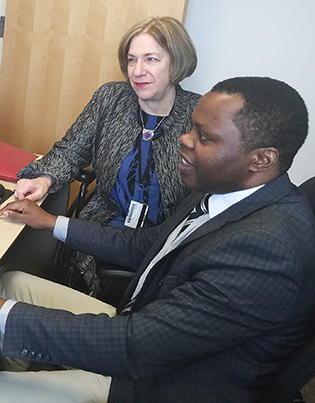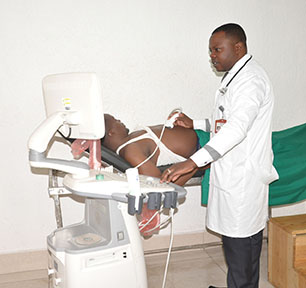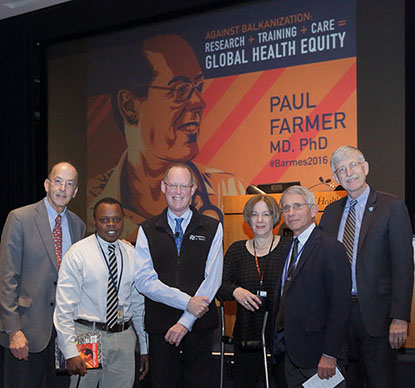Building a Partnership
Rwandan Physician Will Bring Home Lessons Learned at NIH
A physician from the Republic of Rwanda is spending a one-year fellowship at the NIH learning how to conduct clinical research and studying the epidemiology of diabetes and heart disease in African immigrant populations. He plans to use what he learns to help people in his home country.

Rwandan physician Jean Utumatwishima (right) is spending a one-year fellowship at NIH with NIDDK senior investigator Anne Sumner to learn how to conduct clinical research. He plans to use what he learns to help people in his home country.
“I’ve found here a very good place for learning, a very good place for science,” said Jean Utumatwishima, who was the director of the Kinihira Provincial Hospital, a rural hospital in the Northern Province of Rwanda. “It’s encouraging for me to go back and try to bring these lessons back home.”
Utumatwishima’s fellowship is a unique inter-institute and international partnership involving the Rwanda Ministry of Health, the National Institute on Minority Health and Health Disparities (NIMHD), and the National Institute of Diabetes and Digestive and Kidney Diseases (NIDDK).
The idea for this fellowship was born after a visit to the NIH by then–Rwandan Minister of Health, Agnes Binagwaho, to deliver the 2015 Barmes Lecture for Global Health. Binagwaho spoke about her country’s recovery from the 1994 genocide, the value of research and capacity building to make a health system resilient, and the importance of training and empowering Rwanda’s own researchers. Inspired by Binagwaho’s lecture, Anne E. Sumner, chief of NIDDK’s Section on Ethnicity and Health, reached out to the Fogarty International Center to arrange contact with Binagwaho. Sumner’s research focuses on identifying biomarkers that can be highly predictive of prediabetes and cardiovascular disease in people of African descent including both African-Americans and African immigrants.
“One conversation led to another,” said Sumner, “and that led to the recruitment of a Rwandan physician to come to work with me at NIH.” With the support of NIDDK’s Scientific Director Michael Krause and NIMHD’s Director Eliseo J. Pérez-Stable, Sumner arranged for a one-year inter-institute, international fellowship to train and mentor a Rwandan physician in clinical research. Utumatwishima, the first physician chosen, arrived at the NIH in July 2016.
In Sumner’s lab, Utumatwishima studies both how stress affects cardiometabolic disease in African immigrants and how NIH conducts clinical research. He’s also taking courses in endocrinology and statistics. Most of all, he likes how treating patients is entwined with research. “In Rwanda, if you are in research or in public health administration, you rarely go back to the patients,” he said. But NIH’s “principle of bench to bedside and then back—from bedside to bench” has inspired him. “I think this [practice] is something I need to bring back home.”
After Utumatwishima completes his training at NIH, Sumner plans two more years of collaboration and mentorship while he launches his own clinical research in Rwanda.
When he gets back to Rwanda, he knows he will “work both in a teaching hospital and in a university.” His goal, he said, is to find better ways to prevent and “detect cardiometabolic diseases in Rwandans now living in Rwanda.” The challenge is that usual biomarkers for prediabetes and cardiometabolic diseases—such as hemoglobin A1c and triglycerides—are not terribly predictive in patients of African descent.

PHOTO COURTESY OF JEAN UTUMATWISHIMA
Jean Utumatwishima performing an ultrasound of the liver in his hospital in Rwanda.
“We’ve engaged in an amazingly positive and enthusiastic collaboration where we’re building on our work about the effect of stress on cardiometabolic disease and diabetes,” said Sumner. “Rwanda has a special history [that] we want to explore more, [focusing on] how to prevent disease in the high-risk population, even moving into studies such as the effect of post-traumatic stress disorder on silent [cardiovascular] disease.”
Sumner’s hope is “to build a whole community of physicians in Rwanda who have this research orientation so that when Jean goes back he’s not by himself in terms of trying to bring a research agenda forward,” she said. “And that’s why we’re recruiting a second Rwandan physician to come join us, so we can create a whole cadre.” That second physician is scheduled to come to the NIH in summer 2017.
Utumatwishima is grateful that NIH has “opened [the] gate” for training opportunities so physicians and researchers like him can help people in their home countries.

CREDIT: BILL BRANSON
Jean Utumatwishima and Anne Sumner attended the November 2016 Barmes Lecture at NIH and met the featured speaker Paul Farmer. Farmer is a co-founder of the nonprofit Partners in Health, which helps to train Rwandan health-care workers. From left: Roger Glass (director of the Fogarty International Center), Utumatwishima, Paul Farmer, Sumner, Anthony Fauci (director of the National Institute of Allergy and Infectious Diseases), NIH Director Francis Collins.
This page was last updated on Monday, April 11, 2022
